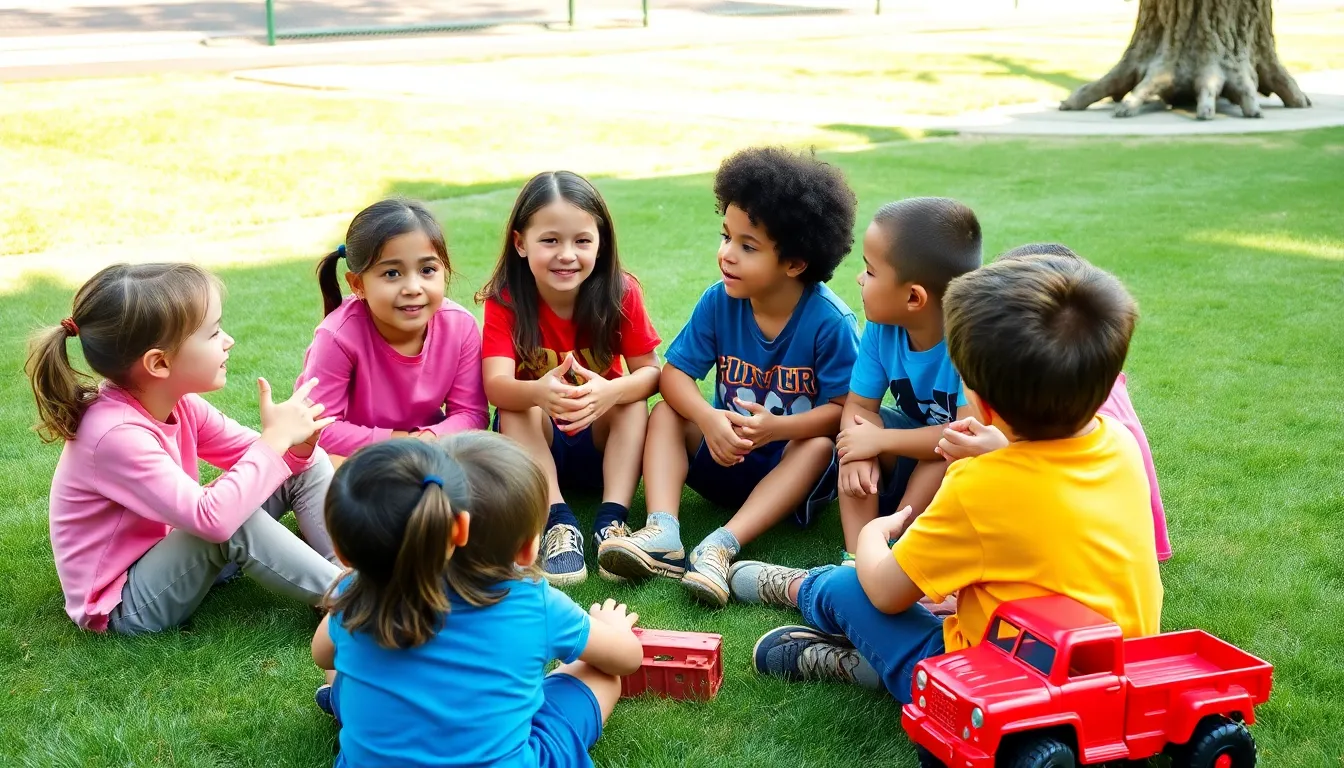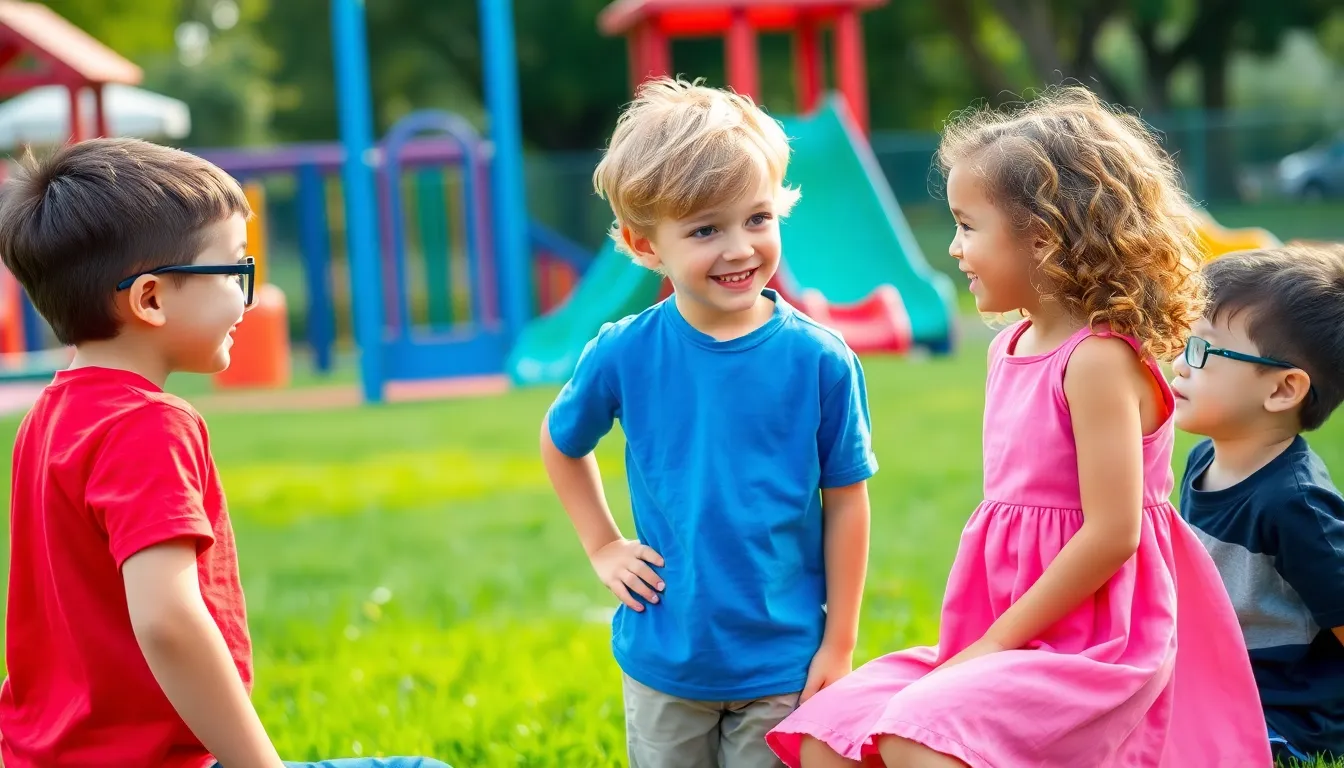Kids can be little bundles of energy and emotions, and when conflicts arise, it can feel like a mini soap opera unfolding right in the living room. Whether it’s over toys, snacks, or who gets to choose the next cartoon, teaching children effective conflict resolution strategies is crucial. After all, if they can navigate these squabbles now, they’ll be better equipped to tackle bigger challenges later on.
conflict resolution strategies for kids
Conflict among kids often stems from their intense emotions and energetic interactions. Identifying the underlying reasons helps adults guide children toward effective resolution.
Common Causes of Conflict
Disagreements commonly arise from competition for resources like toys or snacks. When kids desire the same item, frustration intensifies. Miscommunication contributes significantly; misunderstandings occur frequently among young children. Differences in personality also play a role; some children might be more assertive while others are more passive. Environmental factors, such as busy play areas, can increase tensions. Thus, these triggers create a fertile ground for disputes.
The Importance of Conflict Resolution
Teaching conflict resolution equips kids with essential life skills. Successful resolution fosters empathy and understanding, which are crucial for healthy relationships. Learning to communicate feelings helps children articulate their needs better. Skills in negotiation and compromise establish a foundation for cooperative behavior. As conflicts arise, addressing them effectively prepares children for future challenges in school and social settings. Prioritizing these strategies promotes a harmonious environment, enhancing the overall well-being of children.
Effective Conflict Resolution Strategies for Kids

Effective conflict resolution strategies equip kids with skills for managing disputes and maintaining relationships. Understanding key techniques can significantly aid in resolving conflicts peacefully.
Communication Skills
Engaging in clear communication lays the groundwork for effective conflict resolution. Children should express their thoughts and feelings honestly. Encouraging them to use “I” statements, such as “I feel upset when you take my toy,” can foster understanding. Teaching kids to avoid accusatory language promotes a more open dialogue. Practicing calm tones helps reduce escalation during disagreements. These skills enable children to articulate their needs while respecting others’ feelings.
Active Listening Techniques
Active listening is vital in resolving conflicts among children. Children should focus on the speaker, maintaining eye contact and nodding to show understanding. Paraphrasing what someone else says can confirm comprehension. Kids also benefit from asking clarifying questions, such as “What do you mean by that?” Encouraging patience is essential; they must wait for their turn to speak. These techniques promote empathy, allowing kids to acknowledge different perspectives effectively.
Teaching Kids to Manage Emotions
Teaching kids to manage emotions enhances their conflict resolution skills. Recognizing emotions plays a vital role in this process.
Recognizing Feelings
Identifying feelings is the first step in emotional management. Children can learn to label their emotions like anger, sadness, or frustration. Encouraging kids to express how they feel fosters emotional intelligence. Using visual aids such as emotion charts helps them articulate their feelings. Additionally, asking open-ended questions guides children in reflecting on their emotional experiences. Conversations about various situations enable kids to connect their emotions to actions. Reinforcing the idea that it’s normal to feel a range of emotions promotes acceptance and understanding. Creating a safe space for sharing emotions encourages open dialogue.
Coping Mechanisms
Coping mechanisms provide children with tools to handle strong emotions effectively. Teaching deep breathing exercises helps reduce anxiety and promote calmness. Engaging in physical activities like walking or playing sports channels excess energy positively. Experiencing art, music, or writing serves as an emotional outlet for children. Role-playing scenarios equips kids with strategies for managing conflicts. Encouraging mindfulness techniques, such as focusing on the present moment, helps them ground themselves during turbulent times. Promoting problem-solving skills enables children to brainstorm constructive solutions to conflicts. Reinforcing these coping strategies builds resilience and emotional regulation.
Role-Playing Conflict Resolution
Role-playing serves as a dynamic tool for teaching children how to resolve conflicts effectively. This interactive method allows kids to practice scenarios in a safe environment, enhancing their conflict management skills.
Benefits of Role-Playing
Role-playing offers numerous advantages for children learning to navigate conflicts. Engaging in role-playing boosts confidence by allowing them to practice assertive communication without the pressure of real-life situations. Additionally, it promotes empathy as kids step into each other’s shoes, understanding different perspectives. Practicing these scenarios builds familiarity with conflict resolution strategies, making children more comfortable applying them in real-life situations. Overall, role-playing encourages cooperative behavior, and enhances social skills, reinforcing emotional intelligence.
Examples of Scenarios
Various scenarios can facilitate effective role-playing exercises. A playground dispute over sharing toys serves as an excellent starting point. Children can act out expressing feelings and negotiating solutions. Another example involves a disagreement during group work on a school project, where they practice listening and compromising. Simple scenarios, like deciding which game to play, provide opportunities for kids to experiment with conflict resolution techniques. These examples help children generalize the skills learned and implement them across different situations.
Encouraging Empathy in Kids
Encouraging empathy in children promotes understanding and compassion towards others. It’s essential for their social development.
Understanding Others’ Perspectives
Children can learn to consider different viewpoints through discussion and exploration. Activities like storytelling provide opportunities for them to reflect on how characters might feel in various situations. Engaging in conversations about events helps kids articulate thoughts and feelings while practicing empathy. Challenging scenarios, such as negotiating playtime, allow children to practice seeing things from another’s eyes. Role-playing can also facilitate this understanding, as kids step into different roles and experience diverse emotions. Combining these strategies fosters a deeper connection among peers, making conflict resolution more effective.
Practicing Kindness
Practicing kindness lays the foundation for empathetic behavior. Simple acts of kindness, such as sharing toys or complimenting a friend, demonstrate compassion in everyday interactions. Children can participate in community service activities, which instill a sense of responsibility and social awareness. Encouraging kids to express gratitude strengthens relationships and promotes positive interactions. Celebrating kind actions reinforces these behaviors, making them more likely to occur. When children experience the benefits of being kind, they develop a greater understanding of its impact on others, further enhancing their conflict resolution skills.
Conclusion
Equipping children with conflict resolution strategies lays the groundwork for their social and emotional development. By fostering skills like effective communication active listening and empathy children can navigate disputes with confidence and understanding. These tools not only help them resolve conflicts but also prepare them for future challenges in various environments.
Encouraging emotional intelligence through recognizing feelings and practicing coping mechanisms further enhances their ability to manage disagreements. Role-playing scenarios provide a safe space for kids to practice these skills making them more adept at handling real-life situations.
Ultimately instilling these strategies promotes a harmonious atmosphere where children learn the value of kindness and cooperation. As they grow their ability to resolve conflicts peacefully will contribute to healthier relationships and a more empathetic society.




